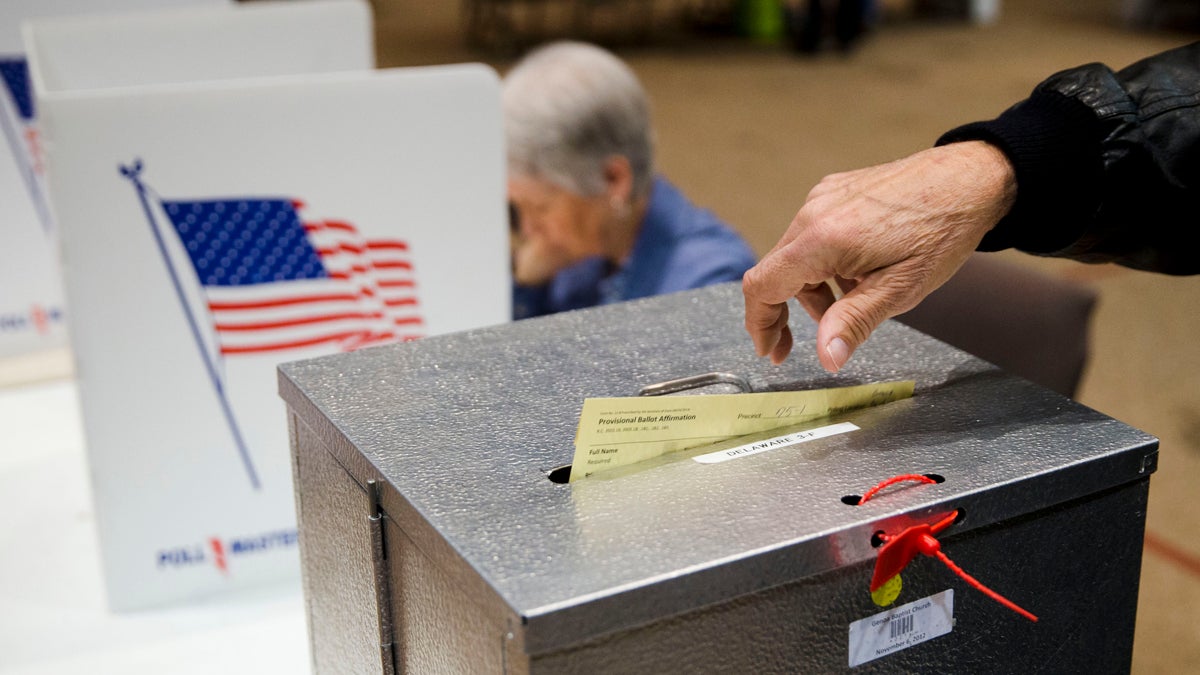Donald Trump and Tipping Point Tuesday

A voter casts a provisional ballot in the primary election Tuesday
The poet-essayist Ralph Waldo Emerson famously said, “Things are in the saddle. And ride mankind.” If he were alive today, he’d likely be a TV talking head, marveling at this presidential campaign, and translating his 19th-century quote into modern parlance: “We’re at the mercy of events beyond our control, so buckle your seatbelts.”
True that, because most of us can only gird ourselves for what lies ahead. By the time the sun rises tomorrow, we’ll likely know whether America is racing toward the darkness – or nudging the brakes.
Welcome to Tipping Point Tuesday, so named (at least by me) because what happens tonight in five Republican primaries – most notably, Ohio – may well tip the balance in the most consequential presidential race of our lifetimes. There’s still time to rescue this nation from a future of authoritarian thuggery, but that window is rapidly closing. We’ll soon know whether it’s staying ajar.
Rather than go deep into the weeds with delegate math, I’ll keep it simple: If Donald Trump wins Florida tonight (which is highly likely, thus finishing off Little Marco), and manages to beat John Kasich in the latter’s home state of Ohio, his triumphs in those crucial winner-take-all states will net him 165 more delegates – 99 in Florida, 66 in Ohio – and distance him from his few remaining rivals by a virtually insurmountable margin. And we can all begin to contemplate the hideous spectacle of a Trump acceptance speech, presumably without plugs for his steaks and wines.
But if Trump loses Ohio tonight (the polls say that’s likely) and the state’s delegates go to Kasich, then the delegate math looks altogether different. An Ohio loss, coupled with modest delegate pickups in the other three voting states – Illinois, Missouri, and North Carolina, all of which allocate delegates via different proportional schemes – would leave Trump in a less dominant position. Ted Cruz would stay in the hunt, as would Kasich.
And then what? Think ahead to the Republican convention in Cleveland. Ben Ginsberg, a longtime attorney for the Republican party says it best: “If Trump doesn’t win (Florida and Ohio), the GOP is likely to find itself in Cleveland with no candidate above the 1,237-delegate majority needed to claim the nomination. If that happens, the Republican party’s own rules lock in quagmire in Cleveland – and likely a multi-ballot, no-holds-barred convention.”
Which hasn’t happened in the GOP since Jerry Lewis was partners with Dean Martin. And if you’re blanking on the names Lewis and Martin, that’s further evidence that the earth has rotated many times since 1948.
Thomas E. Dewey got the nod that summer on the third ballot, without tearing the party apart. But this summer – especially if Ohio tips to Kasich tonight – threatens to be way more toxic. If Trump comes to Cleveland leading in delegates but short of the magic number to win on the first ballot, and winds up losing on a subsequent ballot, his besotted fans may well go berserk. On the other hand, if the demagogue ultimately prevails, a hefty number of Republicans – those who still value civility and sanity – will declare the GOP to be DOA in November.
Maybe we shouldn’t get too far ahead of ourselves; after tonight, nearly half the delegates will still be on the table. Six of the remaining states – including New Jersey – have winner-take-all contests. But most states have proportional allocation rules – including Pennsylvania, which is a true wild card – and that’s a big reason why Trump may have trouble sealing the deal in advance of Cleveland.
And if that happens, things could get very messy.
Under current GOP rules, most delegates are required to support the candidate who won their state contest – but only on the first ballot. After that ballot, most delegates can essentially become free agents. It’s theoretically possible that freed-up delegates would think twice about nominating a guy who (a) knows virtually nothing about policy, (b) goads his fans to “knock the crap” out of protesters, and (c) has uttered pearls of wisdom such as: “Women, you have to treat them like shit.”
As the conservative Wall Street Journal editorial page said yesterday, “Americans want a president they can respect, not one who is a constant source of turmoil.”
Which brings me to Pennsylvania, which could be well positioned to wield clout at a contested convention. Thanks to the state party’s creative rules, 54 of the 71 delegates will be free agents on the very first ballot – in official language, they are “unbound” and need not bow to the wishes of Republican voters in the April 26 primary. And, by the way, if Marco Rubio drops out after losing Florida tonight, his 152 delegates could conceivably be thrown into the unbound pool. (I wanted to bring up the unbounds, in case your head wasn’t spinning already.)
And those are the best scenarios for stopping Trump – who’s likely to render them moot if he wins Ohio tonight and thus dominates the delegate math.
So come on, Ohio, slow this guy down. No pressure!
——-
The Democratic race can be boiled to a sentence: Even if Bernie Sanders wins Ohio and Illinois tonight, Hillary Clinton’s likely victories in Florida and North Carolina will sustain her lead in the delegate count, a lead that’s virtually insurmountable.
Follow me on Twitter, @dickpolman1, and on Facebook.
WHYY is your source for fact-based, in-depth journalism and information. As a nonprofit organization, we rely on financial support from readers like you. Please give today.

